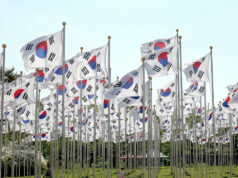Taiwan urges gov’t to scrap ownership limits on foreigners

THE GOVERNMENT should scrap its 40% foreign ownership limit in certain industries to encourage more investments particularly from Taiwan, according to its ambassador in the Philippines.
“Please try your best to abolish the 40% restriction for foreigners in the Philippine Constitution,” Taipei Economic and Cultural Office in the Philippines (TECO) Representative Michael Peiyung Hsu told an online forum on Wednesday.
“It’s very painful for many because we’ve lost a lot of money,” he said at the forum hosted by the University of Asia and the Pacific School of Law and Governance and BusinessWorld.
A Taiwanese science and technology university had considered opening a branch in Batangas province, but would not do so because of the limit, he added.
The 1987 Constitution prescribes a 40-60% ownership ratio in favor of Filipinos for many sectors. Foreigners are also barred from owning land and media enterprises, among other limits.
Philippine congressmen are debating on a proposal to ease economic restrictions of the Charter.
Taiwanese investments in the Association of Southeast Asian Nations (ASEAN) reached $2.66 billion (P127 billion) last year, $133 million of which went to the Philippines, Mr. Hsu said.
ASEAN is Taiwan’s second-biggest trading partner after mainland China, with a total trading volume of $890 billion last year.
Mr. Hsu said the Philippines is not efficiently linked to the global supply chain, which is a disincentive to Taiwanese investors. “Big companies have big concerns like how they are going to export their products overseas.”
Another concern is high electricity costs, he said.
Mr. Hsu said the Philippines has a “very good labor force.” Filipinos, he said, have the advantage of being able to speak English well, which is why companies still come to the Philippines.
He said Taiwan wants to boost cooperation with ASEAN countries including the Philippines especially in agriculture, health, higher education, the environment and tourism as part of its New Southbound Policy under President Tsai Ing-wen.
Mr. Hsu said the move is in response to geopolitical factors, regional integration and US-China trade wars, among other things.
He said the Philippines is important to Taiwan not only because they are near each other, but also given that more than 150,000 migrant Filipinos are working there, mostly in Taiwan’s semiconductor industry.
Taiwan is inviting more Filipinos and other Southeast Asians to work there given its aging population.
Mr. Hsu said the first stage of a technological park for Taiwanese companies in Batangas had been completed. The first Taiwanese techno-park in the country — the Subic Bay Gateway Park in Olongapo City — now has 155 companies that have hired 16,000 Filipinos.
Other main Taiwanese investments in the country are in Clark, Bataan, Cavite and Manila.
Bernardo M. Villegas, an economics professor at UA&P, said lawmakers should change the Charter by lifting economic restrictions.
He said the Philippines needs Taiwan’s support for its agriculture sector, especially in the entire agribusiness value chain all the way to retailing, where two-thirds of Filipinos work.
The Philippines should boost its agribusiness sector once it comes out of the coronavirus pandemic.
Mr. Hsu said Taiwan “will do its best to help improve (Philippine) agribusiness,” adding that Taiwanese agriculture experts were in Manila to see if they can stay here for three years to share their skills and knowledge with Filipinos.
He added that 49 young Filipino farmers would be trained in Taiwan for 11 months in fruit and vegetable farming, livestock and aquaculture.
Taiwan is also training Filipino doctors and nurses to help improve the Philippines’ national health insurance system.
The Philippines in 2019 approved Taiwanese investments worth P2.81 billion, which more than doubled in 2020 to P6.41 billion. Most of the investments were in real estate.
Philippine exports to Taiwan fell by 8.78% to $2.06 billion last year after a 20.58% decline in the sales of semiconductor devices and a 44.17% fall in the export of other digital monolithic integrated circuits.
Philippine imports from Taiwan also fell by 3.89% to $4.57 billion in 2020 from a year earlier. — Bianca Angelica D. Añago



